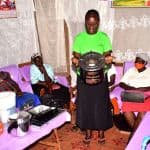Small Tweak, Big Impact: How a ‘Simple Innovation’ Convinced Farmers to Improve Agricultural Inputs
The most tangible pathway out of poverty for millions of households in rural sub-Saharan Africa involves boosting agriculture. Studies have shown that growth in agriculture is more than 2.5 times more effective at reducing poverty than growth originating in other sectors of the economy. That growth requires strong linkages between farmers and profitable markets. Approximately 35 million smallholder households in low- and middle-income countries already engage in direct, mutually beneficial relationships with private businesses through contract farming or less formal off-take arrangements, and many more could benefit from such arrangements.
But sourcing from smallholders can be challenging, due to factors like low yields, high sourcing and extension costs, side-selling and low input recovery, as well as inconsistent quantity and quality. In 2015, TechnoServe launched the Coalition for Smallholder Sourcing – a collaboration between three private agribusinesses and a research partner to run a series of pilots within established smallholder sourcing schemes, aimed at testing and rigorously evaluating innovations with the potential to solve persistent challenges in smallholder sourcing, in order to benefit farmers and strengthen the private sector.
Low productivity among smallholders is one of the most persistent challenges threatening the viability of sourcing arrangements with agribusinesses. Improved agricultural technologies – including the development of better seeds, the invention of drip irrigation, and the production of synthetic fertilizers and pesticides – can raise smallholders’ productivity. For example, a study from Tanzania found that the adoption of hybrid maize seed resulted in a 50 to 60 percent increase in yields and a 45 to 50 percent increase in farmer profits. Agribusinesses sourcing from smallholders also stand to benefit from higher productivity per farmer, since this can drive down the cost of their extension and buying operations per kilogram of product.
As part of the coalition’s work, TechnoServe and the Gulu Agricultural Development Company (GADC), an agricultural company based in northern Uganda, partnered to test a simple innovation aimed at driving up maize productivity through the adoption of hybrid maize seed.
An innovative approach to hybrid seed sales
TechnoServe and GADC landed on the following approach: GADC would offer to sell high-quality maize seeds to farmers at the moment when they sold their crops and had cash on hand. The approach originated in part from an observation that GADC CEO Bruce Robertson made: “We put $8 million into the rural economy each year when we buy cotton and sesame, but when it’s time to buy productive inputs and assets three months later, farmers have no cash available.”
This approach leveraged a number of advantages. GADC offered its supplying farmers the option to buy improved maize seed when they had the cash necessary to turn their intention to invest in hybrid seed into action. The farmers were able to purchase the seed at a convenient location, and because GADC was a trusted partner, the farmers were more likely to perceive the seeds as genuine and reliable.
Testing the innovation
Working with the coalition research partner IDinsight, a randomized control trial (RCT) was conducted. Four hundred eighty-one GADC-supplying farmers were randomly selected to receive the offer to purchase hybrid seed, while 515 were not.
The trial showed that this approach increased the likelihood that farmers would plant high-quality maize seeds by 40 percent, with 28 percent of the farmers in the treatment group planting high-quality maize seed, compared to only 20 percent of those in the control group. Farmers who received and accepted the offer were 47 percent more likely to plant high-quality maize seed than those who had not received the offer. When IDinsight looked at sub-samples, it found that the effects on adoption were much more pronounced among women farmers, nearly none of whom would have used improved seeds had they not received the offer from GADC.
Implications of the findings
These results have implications beyond GADC and Uganda. The results show that agri-businesses have a viable alternative to improve farmers’ access to critical inputs. This approach allows companies operating outgrower models to facilitate access to inputs for suppliers without incurring the risk that they’ll be unable to recover the input credit due to side-selling—a frequent concern in highly competitive markets. Agro-input companies can unlock buying power among farmers by offering key inputs for sale at the point of crop sales. This builds the case for more companies to be engaged in simultaneously buying crops and selling inputs to farmers. Nonprofits and philanthropic organizations focused on increasing food security can leverage agribusinesses’ buying networks to encourage greater adoption of inputs that improve food production.
Moving forward, we also believe that the following tweaks to the approach can further increase the adoption of inputs:
- Build in an awareness campaign and give farmers more advance notice
- Time the input sales to coincide with the peak agricultural sales season, so that farmers have more cash available
- Incorporate “nudges” and other micro-incentives into the marketing campaign
- Target regions with higher levels of technical knowledge, or couple the sales campaign with agronomy training
The TechnoServe Coalition for Smallholder Sourcing is also testing other innovations that may be used in conjunction with, or separately from, this approach.
Nupur Parikh is program director for the Coalition for Smallholder Sourcing at TechnoServe, based in South Africa.
Top photo: Lead farmers in the GADC supply chain. Image by Amanda Satterly/TechnoServe.
Homepage photo: World Bank Photo Collection, via Flickr.
- Categories
- Agriculture, Impact Assessment



